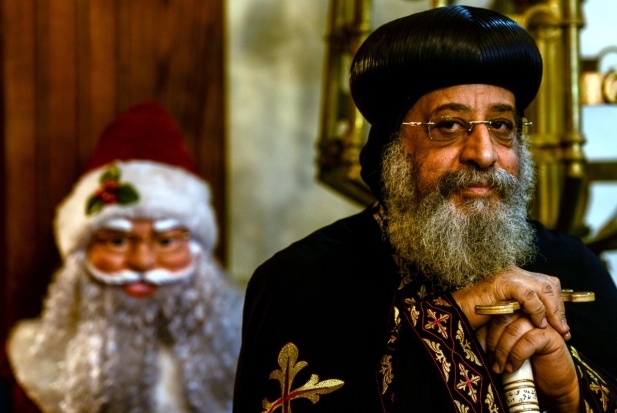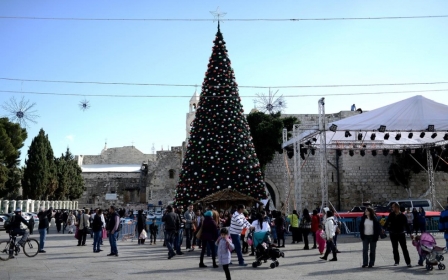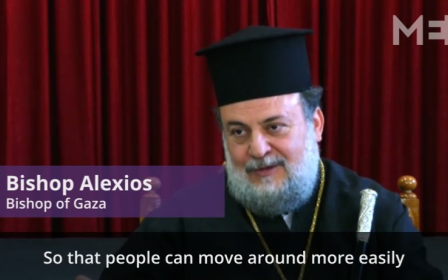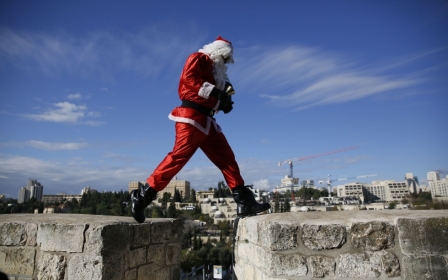Orthodox Christians mark Christmas Eve across region

Christian Orthodox communities around the Middle East gathered to celebrate Christmas Eve on Tuesday, ahead of full Christmas Day celebrations the next day.
The height of the festivities as always was marked in Bethlehem’s Church of the Nativity which some believe was built above Jesus' birthplace.
The majority of Palestinian Christians are Orthodox, with local and international worshipers descending on the West Bank town to take part in the holiday marches, with drums and bagpipes – a remnant of British mandate rule over historic Palestine – booming out since the early hours.
Despite cold weather and a snowstorm expected to descend upon the region, the Syrian Orthodox archbishop, the Greek Orthodox patriarch of Jerusalem, Coptic Orthodox archbishop and Ethiopian Orthodox archbishop, all turned out to attend Christmas Eve prayers.
"Because we have the Church of the Nativity, this is why it [Christmas] is special here. The patriarchs come to here, during the Latin [Catholic] Christmas and during our Christmas [the Orthodox],” Bethlehem resident Hiam Banora told The Jerusalem Post.
“This is the most joyful Holiday because it is when Jesus was born," Banora said.
Celebrations held across the region
Outside of Palestine, Orthodox Christians from Egypt to the Gulf, and even in war-torn Syria, also gathered to mark the day.
In icy waters off Turkey, priests dove to retrieve wooden crosses in an act said to mark the Epiphany, the moment that the Bible says Jesus was revealed to be the son of God.
The festivities came just days after Turkey announced that it would allow the first church in a century to be built in the country. Serving Turkey's tiny Syriac community, the church will be housed in the Istanbul suburb of Yesilkoy, on the shores of the Sea of Marmara, which already has Greek Orthodox, Armenian and Catholic churches.
"It is the first [new church] since the creation of the republic [in 1923]," a government source told AFP news agency. "Churches have been restored and reopened to the public, but no new church has been built until now."
Meanwhile in Egypt, President Abdel Fattah al-Sisi became the first incumbent to participate in Coptic Christmas celebrations, attending a service at St Mark’s Coptic Cathedral in eastern Cairo. The service was also attended by Grand Sheik Ahmed al-Tayeb, the head of Al-Azhar, the Sunni Muslim world's premier Islamic institution.
After days of speculation as to whether Sisi would attend, the president arrived unexpectedly at the ceremony, forcing Pope Tawadros, the head of the Coptic Orthodox Church in Egypt, to stop his prayers halfway through to announce the president.
“We feel that our Egypt is embarking on an era of new thought. All of have built it together as Egyptians in the name of our future,” Pope Tawadros said.
Sisi’s attendance “confirms the love felt during all religious and national celebrations; that is why all that is built on the foundations of love will flourish and prosper”, he said.
Coptic activist Romani Jad al-Rabb, head of the Kelma Human Rights Centre, told Egyptian news site al-Mesryoon: “Since the revolution of 1952, no Egyptian President has attended a Coptic festival; they have just sent their deputies. But the church has attended and participated in all Islamic festivals.”
Violence breaks out
Egyptian Copts are believed to make up about 10 percent of Egypt’s population, with estimates varying widely from just under 10 million, to 20 million, by some Coptic claims.
However, violence has marred religious co-existence in Egypt, with government security forces accused of targeting Christian protesters in Cairo in 2011; in what came to be known as the Maspero Massacre, at least 24 people were killed and more than 200 injured.
The Christian community in Minya, in central Egypt, has also become a flashpoint for religious unrest – the bloodiest incident of which took place between alleged Muslim Brotherhood supporters and local Christians in 2013.
On Tuesday, an apparently religiously-inspired attack once again rocked Minya, as unknown gunmen shot dead two police officers guarding a church.
The Coptic Orthodox and Catholic churches subsequently called off planned Christmas events, stressing that only prayers and church services would be held.
"We've decided to cancel Christmas celebrations and only hold prayers and church services in the spirit of mourning for the two policemen killed by traitors while guarding one of Minya's churches," Minya's Coptic Orthodox and Catholic diocese said in a statement on Tuesday.
The church urged the authorities to "swiftly identify and arrest the culprits".
Christians in Egypt's Sinai desert region, which is steeped in Biblical history, were also forced to conduct muted commemorations due to the precarious security situation in the troubled peninsular, much of which is currently under emergency rule following a spate of deadly attacks on soldiers.
In al-Arish, the main city in northern Sinai, Coptic Christians went against tradition by beginning their celebrations at 15:00 local time. Festivities usually start at 03:00, but this year they were rescheduled because of a curfew, which runs from 19:00 until 06:00.
Abanub Gerges, co-ordinator of the Coptic Coalition of North Sinai, said it was the first time such a change had taken place. The area’s largest festivities were held at Mar Gerges Church in central Arish, a “symbolic” location that was set alight by vandals in August 2013.
Celebration venues were guarded by soldiers and police dogs.
Diverse history in the Middle East
Orthodox festivities were held in Syria’s capital Damascus as worshipers gathered in the Christian quarter of the Old City to mark Christmas Eve.
Lebanon, which holds national holidays for all its major recognised state religions, also marked the day with many shops and government buildings closed.
Beirut's largely Orthodox Armenian neighbourhood of Bourj Hammoud was a flutter of activity with carollers and church bells echoing out throughout the day. In a tradition unique to Lebanese Armenians, Christmas Day celebrations will be quieter, with many families choosing to visit the graves of loved ones, according to Lebanon's The Daily Star.
Widespread celebrations were also held in the United Arab Emirates, which has a large expatriate Christian community.
In Dubai, Ethiopian Orthodox worshipers – who until the 1950s were administered by the Coptic Church in Egypt – held traditional prayers from 22:00-03:00 local time.
“When we receive communion and leave church we go back home and break our fast by eating anything we want since we have been abstaining for more than a month,” Ethiopian worshiper Tigest Girma told Gulf News.
The Patriarch of the Ethiopian Orthodox Tewahedo Church Mathias I is due to visit Egypt for the first time next week, with hopes high that the six-day visit will further bolster ties between the two churches.
Traditionally some Orthodox churches decree a 45-day period of fasting in the run up to Christmas in which worshipers are expected to abstain from certain foods, most commonly red meat and dairy.
Christianity’s history in the region is diverse and complex, but most the Orthodox denominations have roots in the Eastern Roman Empire, which was headquartered in Byzantium, or what is now modern-day Istanbul.
The Eastern Roman Empire was sacked by crusaders during the Fourth Crusade in 1206 in what was seen to foreshadow the decline of Christianity across the Middle East.
But a plethora of self-governing Churches which are either seen as autocephalous (meaning having their own head) or autonomous has survived to this day.
The 13-day difference between Christmas and Orthodox Christmas celebrations is explained by calendars: While the Latin Church switched to the Gregorian calendar, devised by Pope Gregory in the 16th Century, the Eastern Orthodox churches still use the Julian calendar, created during the reign of Julius Caesar in 45 BC.
New MEE newsletter: Jerusalem Dispatch
Sign up to get the latest insights and analysis on Israel-Palestine, alongside Turkey Unpacked and other MEE newsletters
Middle East Eye delivers independent and unrivalled coverage and analysis of the Middle East, North Africa and beyond. To learn more about republishing this content and the associated fees, please fill out this form. More about MEE can be found here.




